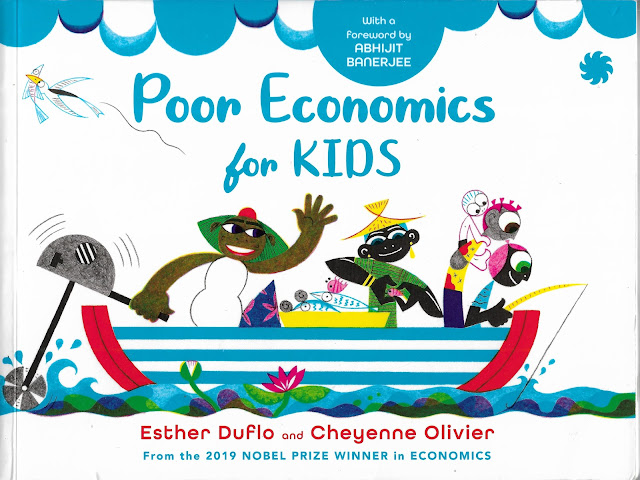Book Title: Poor Economics for Kids
Authors: Esther Duflo and Cheyenne Olivier
Published in: 2024
Publisher: Juggernaut Books
ISBN: 9789353455866
Price: 999/-
Pages: 381
What is this book about?
“This book tells the stories of Nilou and her friends, a group of children and teens, and the adults who live with them. These children live in a village, one which could be in India or Kenya or Vietnam or elsewhere, and we see them deal with some ordinary and not-so-ordinary challenges.” Stories from “a world both very different and yet intensely familiar”.
These stories are connected by a set of common characters, and of course, the setting. Education, health, urban migration, elections, fear, beliefs, food, greenery, livelihood, government, and gender are the topics they touch upon. The issues they highlight are universal.
This is also a book written during or just after the COVID pandemic.
What works in the book?
Illustrations. This book is not text heavy. Its illustrations and fonts are different from those one comes across in Indian children’s books these days. The book size and production quality are friendly; they make flipping pages easy. Together, they keep the reader glued to the stories. My favourite page is the one on education (Nilou – Skips school) where children read “Ar-chi-mede The-o-rem” as “Archie made tea and rum”. It would be fun to discuss the illustrations with the children as also to get them to create fresh stories with these characters.
Text. The format of the book – personal narrative juxtaposed with fictional stories – works well. The personal narrative is peppered with lines that one can reread, “Something incredible happens when people come together and draw a map: they are able to remember everything they have in their village, and also when it was built, when it was repaired or improved, whether it is still in use, etc.”
Questions. The author hopes that the stories encourage readers to “ask many new questions”. The questions, especially those in the story on urban migration (Neso and Najy – Not afraid of the big city), make one wonder!
What does not work?
Approach. These stories present a world that is very simple and nice — government servants are all helpful and people are taking up positive and good actions like “recycling” and “making nice things for all”. A world that is black and white. A world more from the times of Amar Chitra Katha of a couple of decades ago than the Eklavya and Ektara books of today. The book does not respect the intelligence of children.
Cliché. In the story on health (Afia is feeling sick) the pharmacist has “fake pills” and the villagers “love antibiotics”. The rich person is fat and a villain while “scientist” and “best way” go together. This book ends up underscoring the cliché. They reminded me of Stephen Fry’s well-known take on cliché, “It is a cliché that most clichés are true, but then like most clichés, that cliché is untrue.’
Authors’ lens. Across the stories, the solutions always come from the city – be it the nurse who got free bednets (health), or the government officer who makes payments for trees (greenery), or the supermarket (vegetables) or even the “ideas for activities” and microbanker (livelihood). And, for some reason, the villagers are always being challenged! Lines like this too don’t exactly help, “Have you ever wondered why some people continue to live in faraway villages when life becomes very difficult there?” Is life easier in the cities – especially for those who do not have surplus? In today’s times when increasingly the urban – rural divide is getting blurred what are “faraway villages”? And, “faraway” from whom?
Lack of clarity. Neither the title of the book nor the age group the book caters to are clear. On the one hand, the book talks of too many issues, on the other, it has little to offer that is fresh. The price of the book will make it out of bounds for those it talks about. And, could the title have been more apt?
Previous book reviews at Teacher Plus
Pratham Books - (sets) one and two
UNESCO World Heritage series by Mapin
Textbooks for Sustainable Development by MGIEP
Adi and Anku by Menstrupedia
My voice, My story: Sita and Helen by Shailee
Talon the falcon by Deepak Dalal
A Year in the Hills by Katie Bagli
Up the mountains of India by Mala Kumar


Comments
Post a Comment